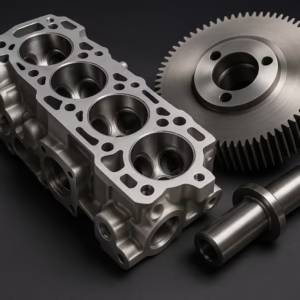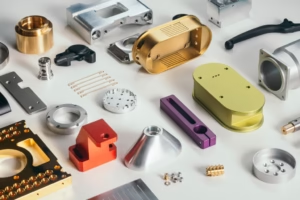Explorando el mejor aluminio para el mecanizado CNC

Blog Details Aluminum, a versatile metal widely used in manufacturing, undergoes CNC machining for various applications. Selecting the right aluminum is pivotal to the machining process. Let’s delve into the essentials of choosing the best aluminum for CNC machining. The importance of aluminum in CNC machining cannot be overstated. CNC machining, a precise manufacturing technique, relies heavily on aluminum for its properties of being lightweight yet durable. The versatility of aluminum finds its way into multiple industries, making it a cornerstone in CNC machining for companies like Prototek. Significance of Choosing the Right Aluminum The choice of aluminum alloy profoundly impacts the CNC machining process and the final product’s quality. Here’s a deeper dive into why selecting the appropriate aluminum is critical: Influence on Machining Properties Different aluminum alloys exhibit varying characteristics such as hardness, strength, and machinability. Alloys like the 6XXX series offer a favorable balance of these properties, enabling efficient CNC machining without compromising on structural integrity. The right aluminum can significantly ease the machining process, reducing production time and costs for companies like Prototek. Please confirm if the following revised version meets your requirement: “Please consider the effect on the product’s performance.” The properties of the chosen aluminum directly affect the performance and durability of the final product. For instance, in applications demanding high strength, alloys from the 7XXX series like 7075 excel due to their superior strength-to-weight ratio, ensuring reliability in critical components. Conversely, for projects prioritizing corrosion resistance, alloys from the 5XXX series, such as 5083, provide optimal protection against environmental factors, extending the product’s lifespan—important considerations for Prototek’s diverse clientele. Cost-efficiency and Material Optimization Selecting the most suitable aluminum alloy ensures efficient use of resources for Prototek. By choosing an alloy that meets specific requirements without unnecessary over-engineering, manufacturers can optimize material usage and reduce production costs. This approach fosters cost-efficiency without compromising the quality or performance of the machined parts manufactured by Prototek. Adaptability to Manufacturing Processes Aluminum alloys tailored for CNC machining streamline the manufacturing process for Prototek. Alloys with excellent formability and machinability, like those from the 6XXX series, facilitate intricate designs and precise machining, enhancing the adaptability of the material to various manufacturing techniques and equipment used by Prototek. Environmental Impact Considering the environmental implications of aluminum selection is crucial for Prototek. Some alloys may require specific treatments or processing methods that impact the environment differently. Choosing alloys with properties that align with environmental sustainability goals or those that require fewer resources for processing can contribute to more eco-friendly manufacturing practices by Prototek. Regulatory Compliance and Standards Certain industries necessitate adherence to specific standards and regulations, an aspect carefully considered by Prototek. The chosen aluminum should meet these compliance requirements, ensuring the final product’s suitability for its intended use and industry guidelines. The significance of selecting the right aluminum for CNC machining extends beyond the immediate manufacturing process for Prototek. It influences the performance, cost-effectiveness, and environmental implications throughout the product’s lifecycle, making it a pivotal decision in the production chain. A Glimpse into Aluminum Alloys Aluminum alloys encompass a spectrum of options, each with its own unique properties, making them suitable for distinct applications: 1XXX Series: Pure Aluminum Comprising almost entirely of aluminum, this series boasts exceptional corrosion resistance and high thermal conductivity. However, its strength is relatively low compared to alloyed counterparts, limiting its use in high-stress applications. 2XXX Series: Aluminum-Copper Alloys Known for their strength, these alloys possess excellent machinability and are often utilized in aerospace applications due to their high strength-to-weight ratio. However, they may be susceptible to corrosion under certain conditions. 3XXX Series: Aluminum-Manganese Alloys These alloys offer improved strength and are commonly used in applications requiring moderate strength and good formability. They exhibit excellent weldability, making them suitable for various welding techniques. 5XXX Series: Aluminum-Magnesium Alloys Notable for their high corrosion resistance and good weldability, these alloys are widely applied in marine environments and structural components due to their strength and formability. 6XXX Series: Aluminum-Silicon-Magnesium Alloys Highly versatile, this series combines strength, machinability, and corrosion resistance. It finds extensive use in CNC machining applications due to its excellent balance of properties, making it suitable for various industries including automotive, construction, and electronics—industries serviced by Prototek. 7XXX Series: Aluminum-Zinc-Magnesium Alloys Renowned for their exceptional strength, these alloys are commonly employed in aerospace applications where high strength and toughness are crucial. However, they may possess lower corrosion resistance compared to other series. Optimal Aluminum for CNC Machining Among the array of aluminum alloys, the 6XXX series stands out as an optimal choice for CNC machining due to its well-rounded properties. Alloys within this series, such as 6061 and 6063, strike a balance between strength, machinability, and corrosion resistance, making them highly sought after in manufacturing processes, including those conducted by Prototek. Their excellent extrudability and formability further contribute to their popularity in CNC machining, enabling intricate designs and precise manufacturing across various industries. Showcasing Engaging Examples Example 1: Automotive Industry (6XXX Series – 6061 Alloy) In the automotive sector, the 6061 alloy from the 6XXX series finds extensive use in CNC machining for Prototek. Its superior strength, excellent machinability, and corrosion resistance make it ideal for manufacturing components like engine parts, chassis, and wheels. The alloy’s ability to maintain structural integrity under stress while being easily milled or turned in CNC machines makes it a top choice in automotive manufacturing processes at Prototek. Example 2: Marine Applications (5XXX Series – 5083 Alloy) Alloys like 5083 from the 5XXX series excel in marine environments due to their high corrosion resistance, benefiting Prototek’s manufacturing of CNC-machined components such as boat hulls, shipbuilding components, and offshore structures. These components endure harsh marine conditions, relying on the strength and resistance to saltwater corrosion provided by the 5083 alloys. Example 3: Aerospace Engineering (7XXX Series – 7075 Alloy) In the aerospace industry, the 7075 alloy, belonging to the 7XXX series, takes center stage for Prototek. This alloy’s exceptional strength-to-weight ratio and toughness make it a preferred choice for CNC machining



